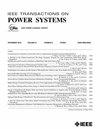利用负载建模中的需求响应进行电压和无功功率控制研究
IF 7.2
1区 工程技术
Q1 ENGINEERING, ELECTRICAL & ELECTRONIC
引用次数: 0
摘要
在现代电力系统中,发电和负荷组成正在发生变化,系统正在向其稳定极限移动。在这些系统中,在评估电网电压和无功控制管理方面时,应更多地强调与需求响应(DR)相关的可能性和替代方案。为了进行充分的系统研究和评估系统性能,以适当的方式对系统组件建模是至关重要的。本文详细讨论了与电压和无功控制的DR可能性相关的负载建模方面。提出了一种无功电压(QV)分析方法,以确定在接近标称电压水平的突发事件中,负载通过DR提供电压和无功支持的能力。介绍了不同的负载建模方法,即静态和动态负载模型,并详细分析了它们对网络电压和无功控制的影响和局限性。研究表明,DR动作可以集成到复合负载模型中,从而能够利用现有的网络规划模型分析无功功率管理和电压控制。本文的研究结果对网络所有者和系统运营商决定其研究模型中所需的细节水平具有重要意义。本文章由计算机程序翻译,如有差异,请以英文原文为准。
Utilizing Demand Response in Load Modelling for Voltage and Reactive Power Control Studies
In modern power systems the generation and load composition are changing, and systems are moving towards their stability limits. In these systems more emphasis should be given to demand response (DR) related possibilities and alternatives when assessing network voltage and reactive power control management aspects. To perform adequate system studies and assess system performance it is of critical importance to model the system components in adequate manner. In this paper, load modelling aspects related to DR possibilities for voltage and reactive power control are discussed in detail. A reactive power-voltage (QV) analysis approach is proposed to determine the load's capability to provide voltage and reactive power support through DR during contingencies near nominal voltage levels. Different load modelling alternatives, i.e. static and dynamic load models, are covered together with detailed analysis on their influence and limitations regarding network voltage and reactive power control. It is shown that DR actions can be integrated into composite load models in a manner that enables the analysis of reactive power management and voltage control with existing network planning models. The results presented in this paper are relevant for network owners and system operators when deciding the needed level of details in their study models.
求助全文
通过发布文献求助,成功后即可免费获取论文全文。
去求助
来源期刊

IEEE Transactions on Power Systems
工程技术-工程:电子与电气
CiteScore
15.80
自引率
7.60%
发文量
696
审稿时长
3 months
期刊介绍:
The scope of IEEE Transactions on Power Systems covers the education, analysis, operation, planning, and economics of electric generation, transmission, and distribution systems for general industrial, commercial, public, and domestic consumption, including the interaction with multi-energy carriers. The focus of this transactions is the power system from a systems viewpoint instead of components of the system. It has five (5) key areas within its scope with several technical topics within each area. These areas are: (1) Power Engineering Education, (2) Power System Analysis, Computing, and Economics, (3) Power System Dynamic Performance, (4) Power System Operations, and (5) Power System Planning and Implementation.
 求助内容:
求助内容: 应助结果提醒方式:
应助结果提醒方式:


